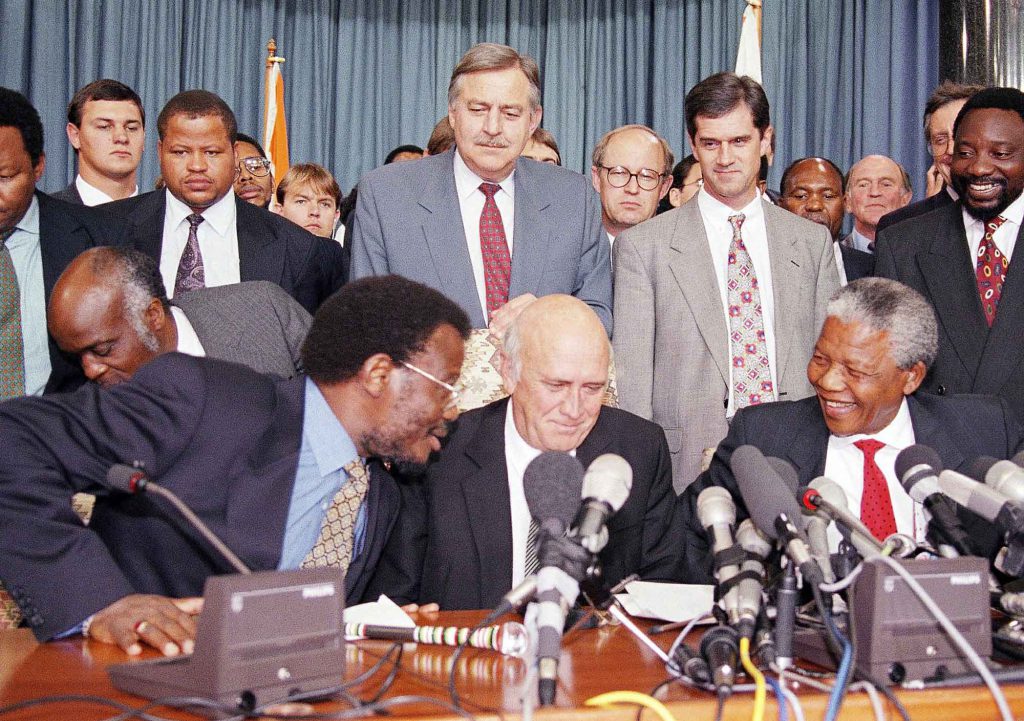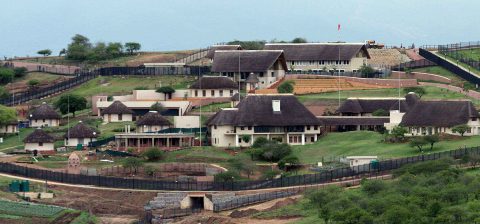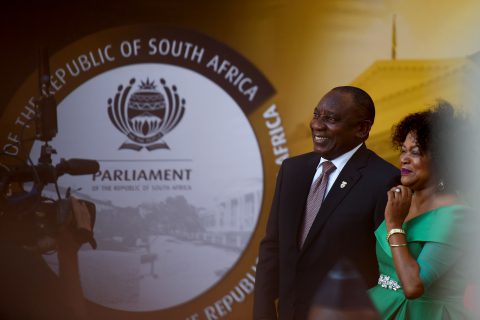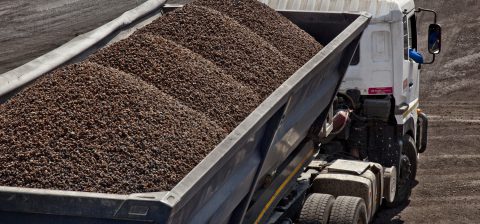Business Day 25 Years of Democracy
Politics In Transition
The first 25 years of democracy have been filled with political drama, including the Constitution-making process and Nelson Mandela’s famous dressing down of FW de Klerk over what he saw as bad faith negotiations; the cobbled-together Government of National Unity, which was doomed to fail even before it began; the closure of the United Democratic Front and the consolidation of control of the ANC by those who had been in exile; the collapse of apartheid’s strongmen, the National Party; ANC-breakaway parties the UDM, Cope and EFF having various degrees of success; the rise of the DA as an opposition party taking power in some key centres from the ANC; the rise and fall and rise and fall (and rise again?) of Jacob Gedleyihlekisa Zuma; and finally, the Valentine’s Day 2018 takeover of the government by #CR17 aka Thuma Mina aka Cyril Matamela Ramaphosa.
The first vote
Any of these things, and more, would have various degrees of significance for different people who operate in the political space, but for ANC Western Cape elections co-ordinator, former premier and former ambassador to the United States, Ebrahim Rasool, the most critical milestone of the past 25 years was what happened on 27 April 1994, when South Africans voted for the first time for a democratic government. “It was really something that we believed in and although we all shouted freedom in our lifetime, it was more in hope than in conviction. We took our three-year-old daughter and some good friends with us to vote and that night we had a huge celebration,” Rasool says.
Good Party leader Patricia de Lille agrees with Rasool on the significance of the first vote, but not much else. In 1994, a rainbow nation was born out of decades of conflict and an unlawful apartheid state. Who will ever forget the long and joyous queues of people waiting to cast their first vote to give birth to our democracy?
“In the early years of our democracy, many of us operated under the euphoria of what had been achieved and how our peaceful transition was celebrated throughout the world. We were led by an inspirational and unifying leader, Tata Nelson Mandela, and South Africans largely revelled in their rainbow nation status and the freedoms and rights they now enjoyed.”
No accountability
“Of course, behind the scenes, it wasn’t all as it appeared to be. Some of the key turning points in our politics must include the exposure of the corruption in the arms procurement deal.
“It is almost 20 years ago that I exposed the massive corruption in the arms deal when I addressed the national assembly in September 1999.”
“The veneer of the ANC governing in the interest of all South Africans began to peel off from that day onwards. I don’t think our country, or our democracy, has been the same since then. Obviously, the extent of their maladministration and corruption spiralled out of control to the point where we are today — watching the horror of the depth of that corruption as it unfolds at the Zondo Commission.”
“My assessment of the past 25 years brings me to the sad conclusion that our political leaders have failed South Africans,” says de Lille.
For EFF general secretary, Godrich Gardee, “one of the most amazing developments of the past 25 years, and especially in recent years, is how Parliament and the courts have been holding the executive to account.
“There is a measure of transparency and, with the influence of the EFF, there has been change in the political landscape in South Africa.”
DA premier candidate in the Western Cape, Allan Winde says: “While the ANC campaigns on nonsense promises and the EFF campaigns on hatred and violence, the DA will build ‘One South Africa for All’, fighting corruption, upholding rights, delivering quality services and keeping our people safe.”
Judith February, senior research associate at the Institute for Security Studies, believes that the shift from apartheid to democracy was seismic in every way. “There can be no doubting the power of the ballot and shifting to a constitutional democracy where human rights hold primacy.”
“Despite civil and political rights being won, South Africa remains deeply unequal with high levels of poverty and unemployment. The ANC-led state has been complicit, often criminally so, in state capture and corruption, further entrenching inequality and a lack of social cohesion,” says February.
Challenging the status quo
“This ANC, riven with division, lost support in the 2016 local government elections. It failed to gain majorities in Tshwane, Johannesburg and Nelson Mandela Bay — previously unthinkable.Opposition parties, however, remain weak nationally and despite the dismal failures of the ANC, they do not appear to have sufficient support in place to challenge the ANC as the ruling party.”
“The question one has to ask is whether the DA has reached its ceiling and whether the EFF is simply seeking a role as coalition kingmaker and unprincipled disruptor of our politics,” says February.
Author and television talk show host, Onkgopotse JJ Tabane says the two sentiments that best summarise the trajectory of our politics over the past 25 years are: “The ANC government has lost its innocence; and our democracy has lost its predictability”.
“The extent of corruption means that liberation heroes are now seen as humans, who may end up in prison, not for heroic deeds, but for anything from fraud, theft and even murder as we have seen in KwaZulu-Natal. The current configuration of local government where the ANC is not in charge of major metros was unthinkable not so long ago. This has made the electoral system less predictable and may well be a precursor for power changing hands in some provinces,” says Tabane.
Journalist and author, Zubeida Jaffer believes that the election places a different kind of pressure on voters: “The top three parties all exhibit two faces. Voters will have to figure out whether these two faces represent a full-blown split personality, or whether one face will assert itself over another once the outcomes are clearer.
One face of the ANC suggests that the party will clamp down on corruption and get the economy going. The other face suggests that not much change can be expected. The rot is deep and voters will have to understand that there are many determined to carry on with illicit actions as usual.
“For a few short years the DA was able to successfully sing its song ‘where the DA rules, governance is best”. This is one face.
“The other face is one of in-fighting in the City of Cape Town and contestation between entrenched white leadership and upcoming black leadership.
“The EFF’s one face is enticing. It is committed to challenge the old economic order and fight for a set of rules that will benefit not just an elite, but the poor as well.
“Its other face demonstrates an active inclination towards racist and fascist conduct that can potentially do great harm to the fragile South African psyche,” says Jaffer.
A televised spectacle
Jonathan Jansen, professor in education at the University of Stellenbosch, believes that one of the major shifts in the political landscape is the deterioration of the public discourse. “While South Africans have always been passionate debaters in the public sphere, our terms of engagement have become toxic to the point of threatening our fragile democracy. In this respect the South African parliament has become a key contributor with its televised distribution of personal insult and vexatious behaviour by those charged with representing the people.
While for many this parliamentary spectacle has become a form of entertainment, such behaviour does filter through into the broader society.
“The advent of social media not only amplifies the problem of vile discourse, but also offers the cover of anonymity to offenders. We neglect this degradation of the public discourse at our own peril,” says Jansen.
Thuma Mina
Struggle veteran and founding member of the South Africa First movement, Patric Tariq Mellet, says: “Over 50 years ago, aged 13, I began a journey of resistance against apartheid, poverty and hopelessness. Like many others, I hoped for the fulfilment of my dream: a society free of racism and the neo-fascist apartheid system and police state that caused us so much pain, as well as a society freed from abject poverty.
“Today I feel that the dream has been deferred, betrayed,” says Mellet, who is sceptical of Cyril Ramaphosa’s chances of bringing about change in the ANC.
“Regardless of good personal leadership qualities, Cyril Ramaphosa is a hostage president, and what South Africa sorely needs is a president who can do more than just see foreign investment as our saviour.”
“We need leadership that can tap into our society to unleash, encourage and facilitate innovative self-reliance for a future pregnant with possibilities,” says Mellet.
The ANC’s Rasool believes that in Ramaphosa, “we have at least the hope and the chance of renewal and of a new dawn”.
“I do believe that our future lies in continuing to avoid the twin perils of populism on the left and privilege on the right. The ANC still represents an imperfect but fairly good middle ground between those two temptations,” says Rasool.






 Sign-up and receive the Business Media MAGS newsletter OR SA Mining newsletter straight to your inbox.
Sign-up and receive the Business Media MAGS newsletter OR SA Mining newsletter straight to your inbox.